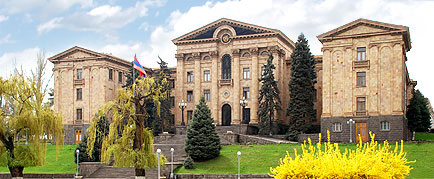On October 1, 2009, on the initiative of the Standing Committee on Foreign Relations of the National Assembly, headed by Mr. Armen Rustamyan, Parliamentary Hearings in the National Assembly on 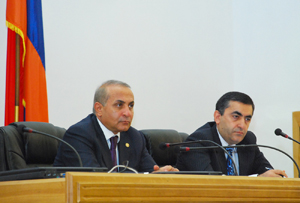 “Initiated Protocols and the Normalization Process of Armenia-Turkey Relations” were held. Representatives of legislative and executive bodies, of science and educational areas, NGOs and journalists participated.
“Initiated Protocols and the Normalization Process of Armenia-Turkey Relations” were held. Representatives of legislative and executive bodies, of science and educational areas, NGOs and journalists participated.
Mr. Hovik Abrahamyan, President of the National Assembly addressed those participating with an opening speech:
Dear colleagues,
Ladies and gentlemen,
I welcome you and express hope that during these hearings we’ll discuss in detail the current stage of normalization of the Armenian-Turkish relations, as well as the two initiated protocols reflecting the reached agreements.
The goal of these hearings is to enable the deputies, political forces represented in the parliament to discuss the issue from the professional and political view, submit approaches and proposals.
The National Assembly is the high tribune from where the deputies representing different layers of the people and having an exclusive right of speaking in the name of the people can submit the most important issues with open discussions to the attention of the public.
These hearings are special, as for the first time an opportunity has been given to discuss in detail the important international documents before signing them. I highlight very much everybody’s activeness in this issue. The National Assembly must undertake an active role in public discussions both, in Armenia and in Diaspora.
The study of the protocols demands serious professional analysis.However, they announce a positive beginning: establishment of normal 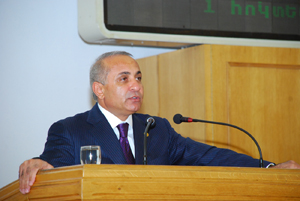 relations between two neighbours, a principle, which is fixed by the Constitution of the Republic of Armenia, which is number one guarantee of the secure and normal development of the states.
relations between two neighbours, a principle, which is fixed by the Constitution of the Republic of Armenia, which is number one guarantee of the secure and normal development of the states.
With the initiated protocols Armenia and Turkey expressed willingness to find main directions of the implementation of good-neighbourly relations based on the common interests. But the publication of the documents promoted the awareness of our society and Armenians all over the world, giving possibility of organizing public discussions at different levels, the involvement of international community and the increase of everybody’s obligation.
The protocols being finally signed by the executive bodies, according to the requirements of Article 81 of the Constitution of the Republic of Armenia, are subject to ratification of the National Assembly. It is one more occasion to examine the issue.
Since gaining independence many negotiations have been pursued at different levels in order to improve the Armenian-Turkish relations. Today, the tangible progress recorded in the normalization process of the Armenian-Turkish relations I consider as a turning point and an event of historical importance, which can be of political and economic considerable significance for the two countries.
I personally greet and support the active foreign policy initiated by the President of the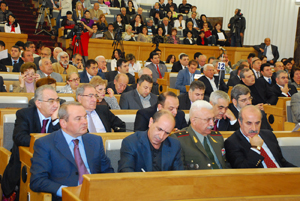 Republic of Armenia in the issues of solving the regional conflicts, in particular the Nagorno Karabakh problem through peaceful way, as well as normalization of the Armenian-Turkish relations without preconditions.
Republic of Armenia in the issues of solving the regional conflicts, in particular the Nagorno Karabakh problem through peaceful way, as well as normalization of the Armenian-Turkish relations without preconditions.
The normalization of the Armenian-Turkish relations is an important process for both sides, which requires a manifestation of political will by the executive and legislative bodies of the two concerned states.
I don’t say that there are no problems, and all of us have our concerns. I am aware of the discontents and concerns of some part of the society, but we should realize there is danger in every initiative, in particular the lessons learnt from the history prompt us to be more alert, take into account with whom we negotiate, not to forget the tricks of the Turkish diplomacy and pursue the negotiations in a way that the settlement of the relations will not have any relation with the Nagorno Karabakh conflict or recognition of the Armenian Genocide, which are not issues of bargaining. Two days ago during the framework of my visit to Iran I had an occasion to discuss these concerns at the important and effective meeting organized with the representatives of the Iranian-Armenian community. Perhaps, we also had to organize the public discussions over the problem in the Diaspora earlier.
I would like to underscore and emphasize that the normalization of the Armenian-Turkish relations does not suppose at all subordination to national interests or denial from the issues of national importance. First of all, it refers to the 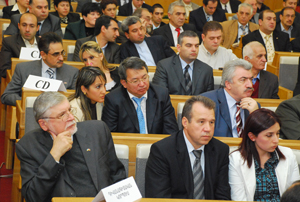 international recognition of the Armenian Genocide. Since the moment of independence the Republic of Armenia has supported the cause of the international recognition of the Armenian Genocide and its condemnation, which is a problem of restoration of historical justice for the Republic of Armenia. It is affirmed “by the declaration of Armenia” of August 23, 1980, being a component part of the Constitution of the Republic of Armenia. The international recognition of the Armenian Genocide occupies a key role in the series of the priorities of Armenia’s foreign policy.
international recognition of the Armenian Genocide. Since the moment of independence the Republic of Armenia has supported the cause of the international recognition of the Armenian Genocide and its condemnation, which is a problem of restoration of historical justice for the Republic of Armenia. It is affirmed “by the declaration of Armenia” of August 23, 1980, being a component part of the Constitution of the Republic of Armenia. The international recognition of the Armenian Genocide occupies a key role in the series of the priorities of Armenia’s foreign policy.
By the establishment of the Armenian-Turkish relations, in our opinion, the process of the recognition of the Armenian Genocide will turn into a new phase. The rise of the official level of the relations will give opportunity to settle the unsolved issues between the two countries through civilized way at state level, by dialogue and in the atmosphere of mutual respect. I do not exclude that the development of relations in future will result in the recognition of the Armenian Genocide by Turkey. At present, the organization of collection of signatures of a number of Turkish intellectuals already testifies about serious changes of approaches in the issue of the Armenian Genocide in the society of Turkey.
Different opinions, concerns and views over the normalization of the Armenian-Turkish relations among different layers of our society, political parties, Diaspora is a very natural and praiseworthy phenomenon. However, they should not turn into undesirable processes of splitting the nations.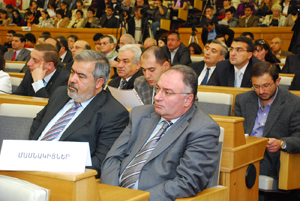
In the conditions of new historical realities the whole Armenian nation again stood before challenges, which requires consolidation of national forces and capabilities, solving united the problems and an imperative of acting in consonance of national interests. The national unity is the main guarantee of the Armenian people’s progress. I am sure that in the conditions of the society’s consolidation we shall be able to solve all our problems.
This high tribune shall serve for the national consolidation through the organization of regular hearings and expressing the approaches of all Armenians all over the world.
I hope that these hearings will result in effective conclusions, which will promote the awareness of the society in this issue.
Thank you.
According to the Foreign Minister of the Republic of Armenia, Mr. Edward Nalbandian, this discussion enables us to hear many views on Armenia-Turkey relations, to understand the comprehensive picture on  certain issues of the public. On another side, the relations with Turkey are the issues of the foreign policy of Armenia, which demand comprehensive observation.
certain issues of the public. On another side, the relations with Turkey are the issues of the foreign policy of Armenia, which demand comprehensive observation.
The speaker considered it natural that after the publicity of the initiated protocols during the public debates, many and incompatible views related to those debates are natural, but the issue today is not the contrasting approaches but comparing them for going ahead.
In response to questions, which interest the public, he gave assurance that there were no preconditions in the document, the fact of the Armenian Genocide was not doubted, there were no obstacles for international recognition of the Armenian Genocide, and there was not a hint on settlement of the NKR problem.
The arguments that if Armenia is holding a dialogue with Turkey, hence the issue of the Armenian genocide will be limited as a debated issue between two countries, and that it will lose its worldwide meaning, are artificial. He gave assurances that the initiated protocols do not give a reason for taking under doubt the right of Armenia seeking historical justice, also the settlement of the Armenian-Turkish relations to exclude any conditions relating to the solution steps of the NKR problem. According to Mr. Edward Nalbandian, it is not only the principle approach of the Armenian authorities but also the approach of the international community, which has expressed its opinion relating to the issue, many times.
According to him, the Armenian-Turkish relation is a psychological, social, legal, economic, and political complicated knot of issues, hence the solution cannot be easy. Armenia tries to establish friendly relations with all its neighbouring countries, and it is important what contribution each of us will have on that path.
According to Mr. Armen Rustamyan, Chairman of 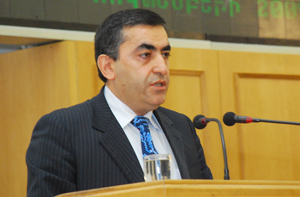 the Standing Committee on Foreign Relations of the National Assembly, the normalization of Armenian-Turkish relations is very important, but not at any price. He reminded the National Assembly that people should pay for that price. There are bases for Turkey’s preconditions, forwarded before in the initiated protocols. That is, the formulation on recognition of general borders enables Turkey and Azerbaijan to avoid the disputed Kars agreement; thus this document is a grant for Turkey as the issue of the Armenian Genocide is reduced to a level of bilateral relations, instead Armenia is obliged to refuse its fair demand. Mr. Rustamyan expressed concern that this process can cause national discord, regarding the release of the relations with the Diaspora.
the Standing Committee on Foreign Relations of the National Assembly, the normalization of Armenian-Turkish relations is very important, but not at any price. He reminded the National Assembly that people should pay for that price. There are bases for Turkey’s preconditions, forwarded before in the initiated protocols. That is, the formulation on recognition of general borders enables Turkey and Azerbaijan to avoid the disputed Kars agreement; thus this document is a grant for Turkey as the issue of the Armenian Genocide is reduced to a level of bilateral relations, instead Armenia is obliged to refuse its fair demand. Mr. Rustamyan expressed concern that this process can cause national discord, regarding the release of the relations with the Diaspora.
According to Mr. Tigran Torosyan, Armenia made some concessions in the document, the reason for which is the bad work and the low level of diplomacy of those who dealt with that issue. He is sure that there were opportunities for solving those issues through more honorable ways.
Mr. Galust Sahakyan noticed that all see the necessity of establishing Armenian-Turkish diplomatic relations, but some are concerned with the further solutions of a number of national and historical issues. According to him, a very difficult road ahead is expected, but he is sure that the started process can solve the issues raised. He called for consistency in overcoming that complicated and difficult path.
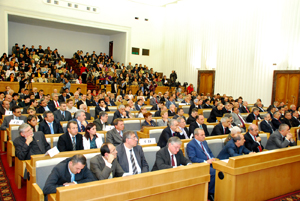 According to Mr. Ara Papyan, this document should be rejected, as it is against the interests of the Armenian people, and for that there are a number of legal bases, according to Mr. Ara Papyan, the initial conditions for Armenia and Turkey are not equal. As Mr. Kiro Manoyan considers, Turkey tries to make the borders in function, legal. According to Mr. Styopa Safaryan, the document is against the national interests of Armenia and he proposes to put it to referendum. According to Mr. Tigran Karapetyan the opening of the borders is an obligatory scenario. Mr. Harutyun Arakelyan urges not to hurry and to take into consideration the provisions of the Kars agreement, and Mr. Aram Karapetyan is assured that though it was not written, but in the context there were three preconditions in favor of Turkey: the recognition of territorial integrity of Turkey, cessation of the international recognition of the Armenian Genocide and conditioning the relations activity by the solution of the NKR core issue.
According to Mr. Ara Papyan, this document should be rejected, as it is against the interests of the Armenian people, and for that there are a number of legal bases, according to Mr. Ara Papyan, the initial conditions for Armenia and Turkey are not equal. As Mr. Kiro Manoyan considers, Turkey tries to make the borders in function, legal. According to Mr. Styopa Safaryan, the document is against the national interests of Armenia and he proposes to put it to referendum. According to Mr. Tigran Karapetyan the opening of the borders is an obligatory scenario. Mr. Harutyun Arakelyan urges not to hurry and to take into consideration the provisions of the Kars agreement, and Mr. Aram Karapetyan is assured that though it was not written, but in the context there were three preconditions in favor of Turkey: the recognition of territorial integrity of Turkey, cessation of the international recognition of the Armenian Genocide and conditioning the relations activity by the solution of the NKR core issue.
Mr. Samvel Nikoyan, Mr. Vardan Ayvazyan, Mr. Eduard Sharmazanov, Mr. Aram Safaryan, Mrs. Heghine Bisharyan, Mr. Martun Grigoryan, Mr. Artak Davtyan and Mr. Mkrtich Minasyan substantiated in their speeches the political and economic necessity of Armenian-Turkish diplomatic relations, at the same time not excluding the expected challenges, for overcoming of which everyday untiring work is needed. They highlighted the protocols without preconditions on developing bilateral relations and establishing diplomatic relations.
Mr. Paruyr Hayrikyan, touching upon the initiated protocols, proposed to shorten the text, removing the preconditions. According to Mr. Davit Lokyan, many legislative amendments are needed to about 70 laws. Mr. Ruben Safrastyan believes that the initiated protocols will give an opportunity of strengthening the security of our country.While studying the provisions he did not find any negative provisions, which can harm the solution of the national issues of the Armenians. Mr. Aram Sargsyan proposed that the documents would be examined according to international rights, and proposed that the Parliament would present a memorandum in which the demands of Armenia should be mentioned. According to Mr. Suren Zolyan, today the time has matured when Turkey should be faced with the fact that the Armenian Genocide should be recognized. Touching upon the Armenia-Diaspora relations, he noted that today it is necessary to be united. Mr. Sukias Avetisyan said that the initiated protocols have not any concern to the settlement of NKR problem and it cannot be speculated in Armenia-Turkish relations. Mrs. Larisa Alaverdyan considers it incomprehensible that the urgency of preconditions does not exist. Mr. Ashot Melkonyan, addressing the parliament, proposed the protocols to be adopted with reservations, and if one of the sides breaches any provision, the protocol is recognized invalid. According to Mr. Gegham Manukyan, the debates were simplified and became an issue of opening or not opening a border, or to be for or against to the development of Armenia.
preconditions. According to Mr. Davit Lokyan, many legislative amendments are needed to about 70 laws. Mr. Ruben Safrastyan believes that the initiated protocols will give an opportunity of strengthening the security of our country.While studying the provisions he did not find any negative provisions, which can harm the solution of the national issues of the Armenians. Mr. Aram Sargsyan proposed that the documents would be examined according to international rights, and proposed that the Parliament would present a memorandum in which the demands of Armenia should be mentioned. According to Mr. Suren Zolyan, today the time has matured when Turkey should be faced with the fact that the Armenian Genocide should be recognized. Touching upon the Armenia-Diaspora relations, he noted that today it is necessary to be united. Mr. Sukias Avetisyan said that the initiated protocols have not any concern to the settlement of NKR problem and it cannot be speculated in Armenia-Turkish relations. Mrs. Larisa Alaverdyan considers it incomprehensible that the urgency of preconditions does not exist. Mr. Ashot Melkonyan, addressing the parliament, proposed the protocols to be adopted with reservations, and if one of the sides breaches any provision, the protocol is recognized invalid. According to Mr. Gegham Manukyan, the debates were simplified and became an issue of opening or not opening a border, or to be for or against to the development of Armenia.
Mr. Khosrov Harutyunyan submitted to the participants of the hearings the view of Christian-Democratic Union, saying that the initiated protocol is a document on making the Armenian-Turkish relations normal. The speaker expressed his view that in new geo-political situation of the region Turkey is interested in the prespective of having influence in Caucasus, and the normalization of relations Turkey needs as much, as 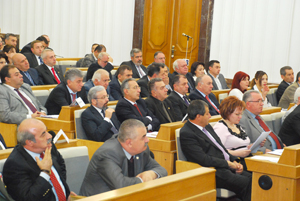 Armenia. The head of the party as threats to the security of our country indicated the Armenian-Turkish relations and the conflict with Azerbaijan, noting that the nomralization of relations with Turkey will mitigate at least one of them. In Mr. Aris Ghazinyan’s opinion, by ratification of protocols the territorial integrity of Armenian and Turkey will be recognized, indirectly, Azerbaijan’s territorial integrity. In his assessment, there is no accidental word in the document, and the provision, regarding terrorism confirms the Turkish version of recognizing the Armenian revenge as ordinary terrorism.
Armenia. The head of the party as threats to the security of our country indicated the Armenian-Turkish relations and the conflict with Azerbaijan, noting that the nomralization of relations with Turkey will mitigate at least one of them. In Mr. Aris Ghazinyan’s opinion, by ratification of protocols the territorial integrity of Armenian and Turkey will be recognized, indirectly, Azerbaijan’s territorial integrity. In his assessment, there is no accidental word in the document, and the provision, regarding terrorism confirms the Turkish version of recognizing the Armenian revenge as ordinary terrorism.
The participants of the parliamentary hearings expressed their views on the initiated protocols. Those who were for the document said that after many years at last there was created an opportunity to develop the Armenian-Turkish relations and to have an opportunity of jointly debating the unsolved issues up to now. Those who were against it, found unacceptable the issue of Genocide to be made an issue of debate regarding economic and cultural possible expansions as well as creating preconditions for NKR conflict to connect with the Armenian-Turkish relations. There was anyhow one united approach: The issue is national and should be solved by the whole nation, without separating the Diaspora. 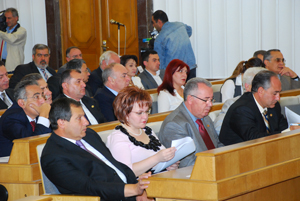
During the hearings President of the National Assembly Mr. Hovik Abrahamyan responded to the raised questions and the expressed concerns.
“Dear participants of the hearings,
Unfortunately many speeches were addressed to the fact how we should use those protocols and we should act, but what Turkey can do. It is a position of the weak.
What are the things we shall do in the issues, around which here concerns, and unfortunately, also speculations were expressed. Some speakers claimed that the normalization of relations with Turkey is an obstacle for the process of international recognition of the Genocide. It’s not like that at all. Armenia-Turkey inter-state relations and the international recognition of Genocide are problems of different planes. Does anybody think that the states, which recognized the Genocide, were led, in my opinion, by the problem of the established Armenia-Turkey relations or being not established? They were led by own interests and human values, and the most important part of which is the prevention of Genocide as a gravest crime against humanity.
Isn’t it understandable that the normalization of Armenia-Turkey cannot influence on recognition of Genocide and with that on the all-human importance of preventing such crimes in future.
It’s necessary not to sow wrong commentaries among the Diaspora Armenians, but to act joint in new consolidated way with the Diaspora.
Now about the sub-committee being involved with historical plane. We highlight that sub-committee. In that sub-committee we’ll also pursue the problems of elimination of the 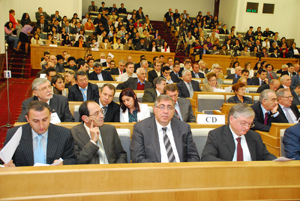 consequences of the Genocide. Regardless of the fact Turkey accepts the crime committed against the Armenians or not, its consequences are evident. It is the existence of Diaspora, it is destruction of the Armenian historical-cultural heritage on the territory of Turkey or being at the edge of destruction. Turkey cannot avoid the discussion of those issues. And the Armenian side will never allow discussion of the issue over the reality of Genocide, being or not being.
consequences of the Genocide. Regardless of the fact Turkey accepts the crime committed against the Armenians or not, its consequences are evident. It is the existence of Diaspora, it is destruction of the Armenian historical-cultural heritage on the territory of Turkey or being at the edge of destruction. Turkey cannot avoid the discussion of those issues. And the Armenian side will never allow discussion of the issue over the reality of Genocide, being or not being.
There were assessments that the re-establishment of the existing border means eternity of that border. Today there not efficient bases, and it’s realistic to raise the issue of reviewing the existing border. It will become possible after international recognition of the Genocide, including by Turkey as an issue of elimination of the consequences of the Genocide.
I consider unacceptable grave accusations of handing over of historical Armenian territories addressed to Armenia’s current authorities. Before the accusation of handing over the territories the communists addressed to Dashnaktsutyun, and not in early past the ANM was addressing the same accusation both to Dashnaktsutyun and communists. There was time, when the majority of political forces was addressing the accusation of rejecting the territories to the first authorities of independent Armenia. I think it’s time to get rid of the approach of speculating the national problems with inner-political goals, solving the most important national problems through dialogue.
Much was spoken about, as if existing connection between the protocols and regulation of NK issue. Isn’t it evident that Turkey has undertaken and will still undertake steps directed to the regulation of the issue emanating from the interests of its ally Azerbaijan. One of those steps is also the closed border, and more correctly, the policy of blockade towards Armenia and NKR.
Isn’t the goal of that blockade clear? Weaken economically the two Armenian states and made going to compromises. Never.
These protocols are directed to the elimination of the blockade by Turkey, and they mean that during the years the policy of blockading did not reach its result. If there are people, who see connection with Karabakh problem, then the connection is just this.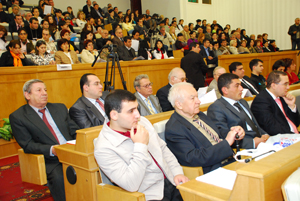
I declare once again that the Republican Party of Armenia, the ruling governmental coalition unequivocally supported the active initiative policy of the President of the Republic, and they are ready to work on implementing to maximum effect the possibilities emanating from this initiative.”
At the end of the hearings Foreign Minister Edward Nalbandian answered to the raised questions and presented some clarifications. He once again noted that the authorities’ position is distinct and clear: Armenia will never put under doubt the reality and recognition of the Armenian Genocide. Answering the question concerning the procedure of preparing the protocols, the Foreign Minister said that the principle of normalizing the relations without preconditions in the basis of negotiations, on which the Turkish side gave its consent. During the further negotiations everybody defended his/her positions: the Armenian side proposed drafts. The creation of the sub-committee studying the historical facts by the Foreign Minister’s commentary, is a process only being envisaged after many steps, and there won’t disputed the fact of the Genocide, but also direct discussions will be held. Besides, the sub-committee will not have any mandate, the Foreign Minister ensured. He called upon to be deprived of political speculations on the  way of solving national important problems. At the end of his speech Mr. Nalbandian noticed that we should refer to all opinions with respect, stressing that the existing public opinions cannot be ignored also in Diaspora, Artsakh, and the visit of the President of the Republic to the Armenian Diaspora centers pursues that goal.
way of solving national important problems. At the end of his speech Mr. Nalbandian noticed that we should refer to all opinions with respect, stressing that the existing public opinions cannot be ignored also in Diaspora, Artsakh, and the visit of the President of the Republic to the Armenian Diaspora centers pursues that goal.
Summing up the hearings Chairman of the NA Committee of Foreign Relations Mr. Armen Rustamyan considered it a serious step and big amount of material for specifying the positions. He noted that the proposals expressed during these discussions with public format the committee will study and try to find agreed and common approaches.
